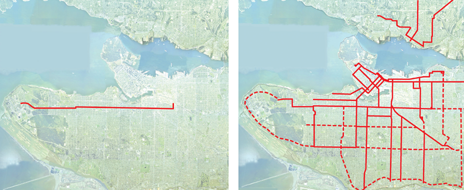SkyTrain Billions Better Spent on Trams: Study
 Map on left shows the conceptual location of the $220-million-per-kilometre Broadway SkyTrain line proposed by the province. On the right is an illustration of how much tram infrastructure you could install for the same price. Map shows heritage streetcar routes as solid lines, and a conceptual expansion of that historic system in dashed lines.
Money for single UBC subway line could pay for region laced by light rail.
Map on left shows the conceptual location of the $220-million-per-kilometre Broadway SkyTrain line proposed by the province. On the right is an illustration of how much tram infrastructure you could install for the same price. Map shows heritage streetcar routes as solid lines, and a conceptual expansion of that historic system in dashed lines.
Money for single UBC subway line could pay for region laced by light rail.
The planned SkyTrain subway spur along Broadway and out to the University of British Columbia campus will cost taxpayers 15 times what it would take to build a tram line along the same route.
In fact, for the $2.8 billion cost of the single 12 kilometre SkyTrain tube from Commercial Drive to UBC, Vancouver could build 175 km of tram lines crisscrossing the city and beyond.
That is the finding of a study led by Prof. Patrick Condon of the UBC Design Centre for Sustainability. His team based their calculations on the recent experiences of Portland, Oregon, and various European cities with light rail transit.
"This study demonstrates that the money needed for one 12 km subway line would be more than enough to rebuild and substantially expand the region's entire historic streetcar system," state the authors, noting that Vancouver and surrounding communities were built along trolley lines dating back to 1890.
Portland success story
But isn't Vancouver now too congested with traffic to make room for street cars on major thoroughfares?
Not if your guide is Portland, which is about the same size as Vancouver and in the last decade has installed tram lines along former street car routes long ago abandoned to busses and autos. Not only did Portland's trams not clog traffic, they stimulated real estate development along their routes, which vitalized neighbourhoods, sparking a building boom that created more tax revenue for the city.
"Within a one-block distance from the streetcar, new net development increased more than three times as rapidly as in any other block-distance," the report's authors calculate.
The demand for cost efficient public transit in Portland came directly from voters, who shot down a bond measure that would have funded a more expensive system. That message from the citizenry caused planners to seek out tram technology that is two thirds cheaper than more common light rail options and vastly less expensive than the SkyTrain system.
Portland tram trips are much slower than SkyTrain, but could be made speedier than automobile travel by coordinating street light changes as the tram travels through intersections, and by giving the tram a dedicated right of way over parts of routes, say the report's authors.
Slower can be better
The tram's pace may be better suited to the cross town UBC run than a faster subway with fewer stops, the authors assert.
"A high speed system is best if the main intention is to move riders quickly from one side of the region to the other. Lower operational speeds are better if your intention is to best serve city districts with easy access within them and to support a long term objective to create more complete communities, less dependent on twice-daily cross-region transit trips."
The report doesn't portray the SkyTrain as a white elephant -- nor is it the all purpose solution to big city transportation needs.
European cities such as Berlin, Vienna, Paris and Dublin offer a model of how to balance "expenditures between high speed trains, subways and light rail, and cheaper and lighter tram systems to serve more complete urban districts."
"There is no doubt that such a system would not be as fast as a subway," concludes the UBC team. "However based on the Portland experience, the benefits may be an improved quality of life in many neighbourhoods, an improved investment climate for higher density homes and job sites, enhanced access for citizens within their own districts and to other parts of the city (especially for the rapidly expanding seniors' demographic) and a substantially reduced cost per ride.
"As our region pushes towards a goal of 80 per cent reduction in per capita greenhouse gas production, it behooves public officials to look carefully at how taxpayer dollars can be most effectively used towards the creation of a very different pattern of transportation than the one we know today. A return to a pattern known before the rise of the automobile may merit a careful re-examination," wrote the authors.
'Take a hard look' urges prof
The $2.8 billion earmarked for the SkyTrain subway line to UBC is "a huge amount of money for a line to serve just the west side," Condon told The Tyee.
"The good news is we have time to figure out how to best use our limited transit money to make a more sustainable city. Portland has used very modest transit investments to make their neighbourhoods better places to live and work; transit for neighbourhoods, not simply through them. We should take a hard look at their experience before it's too late," said Condon, who holds the UBC James Taylor Chair in Landscape and Liveable Environments and is helping to develop a sustainable town for 15,000 residents in Surrey.
The report, co-written with Condon by UBC Landscape Architecture students Sigrid Gruenberger and Marta Klaptocz, can be read
here
http://thetyee.ca/News/2008/06/05/UpWithTrams/



